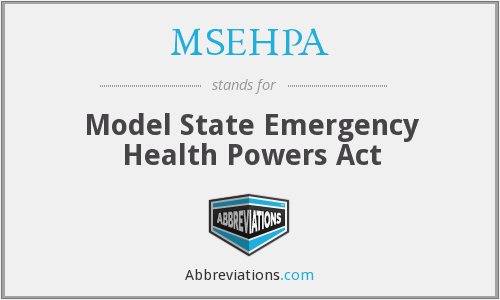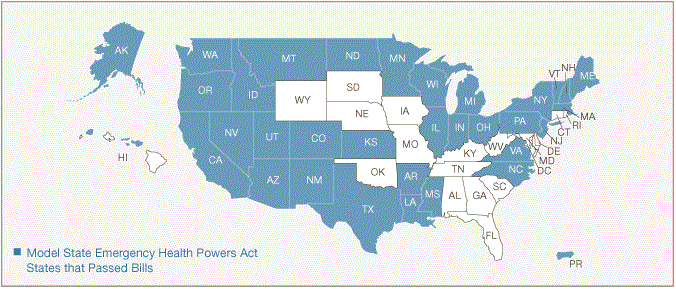
The Model State Emergency Health Powers Act is prepared by The Center for Law and the Public’s Health at Georgetown and Johns Hopkins Universities for the Centers for Disease Control and Prevention [CDC]
The MSEHPA (Model State Emergency Health Powers Act) which was passed by many states in 2002, included provisions that would allow state health officials to use the state militia to:
Take control of all roads leading into and out of cities and states;
Seize homes, cars, telephones, computers, food, fuel, clothing, firearms and alcoholic beverages for their own use (and not be held liable if these actions result in the destruction of personal property);
Arrest, imprison and forcibly examine, vaccinate and medicate citizens without consent (and not be held liable if these actions result in your death or injury).
— ce399
Fortunately for the People, the Supremacy Clause in the U.S. Constitution declares that where federal and state laws conflict, federal law supersedes state law.
Article VI, Paragraph 2 of the U.S. Constitution is commonly referred to as the Supremacy Clause. It establishes that the federal constitution, and federal law generally, take precedence over state laws, and even state constitutions. It prohibits states from interfering with the federal government’s exercise of its constitutional powers, and from assuming any functions that are exclusively entrusted to the federal government. It does not, however, allow the federal government to review or veto state laws before they take effect.
This Constitution, and the laws of the United States which shall be made in pursuance thereof; and all treaties made, or which shall be made, under the authority of the United States, shall be the supreme law of the land; and the judges in every state shall be bound thereby, anything in the Constitution or laws of any State to the contrary notwithstanding.
— US Constitution, Article VI, paragraph 2
The National Research Act (also known as The Federal Policy for the Protection of Human Subjects or The Common Rule) is federal law. The Emergency Health Powers Acts are state laws. Therefore, none of the Emergency Health Powers Acts can violate the protections provided in the National Research Act. Please refer to the article about the National Research Act for further details.
As of August 23, 2021, the Pfizer-BioNTech inoculation is now approved under the brand name Comirnaty. The Comirnaty/Pfizer-BioNTech Fact Sheet for Healthcare Providers Administering Vaccine clearly states that pre-authorization Pfizer-BioNTech vaccine and the Comirnaty vaccine are equivalent. Any objections based on the experimental status of this vaccine are now moot. The argument now becomes whether that approval was legal. Dr. Jane Ruby and Karen Kingston both have concerns about the legality of the approval. See the post about the approval for details.
- October 20, 2021. “Fact Sheet for Healthcare Providers Administering Vaccine [Pfizer-BioNTech].” US Food & Drug Administration. https://www.fda.gov/media/144413/download.

Food & Drug Administration.
This document has instructions for healthcare providers who are administering the vaccines.
Sources:
- December 21, 2001. Lawrence O Gostin. The Center for Law and the Public’s Health at Georgetown and Johns Hopkins Universities. “The Model State Emergency Health Powers Act.”


https://www.aapsonline.org/legis/msehpa2.pdf.
University, PDF. - August 7, 2002. Lawrence O. Gostin, Jason W. Sapsin, Stephen P. Teret, Scott Burris, Julie Samia Mair, James G. Hodge, and Jon S. Vernick. “The Model State Emergency Health Powers Act: Planning for and Response to Bioterrorism and Naturally Occurring Infectious Diseases.” JAMA 288 (5): 622–28.

https://doi.org/10.1001/jama.288.5.622.
Research Journal. - American Civil Liberties Union. “Model State Emergency Health Powers Act.”

https://www.aclu.org/other/model-state-emergency-health-powers-act.
Activist. - July 22, 2021. National Conference of State Legislatures. “Legislative Oversight of Emergency Executive Powers.”

https://www.ncsl.org/research/about-state-legislatures/legislative-oversight-of-executive-orders.aspx.
Collaboration. - September 1, 2010. Mathew Foley. “The Turning Point Model State Public Health Act: Emergency Public Health Law versus Civil Liberties.” AMA Journal of Ethics 12 (9): 735–38.

https://doi.org/10.1001/virtualmentor.2010.12.9.pfor2-1009.
Research Journal. - April 21, 2003. Edward P. Richards and Katharine C. Rathbun. “Review of the Model State Emergency Health Powers Act.” LSU Law Center Climate Change Law and Policy Project.

https://biotech.law.lsu.edu/blaw/bt/MSEHPA_review.htm.
University. - “Model State Emergency Health Powers Act.” In Wikipedia.

https://en.wikipedia.org/w/index.php?title=Model_State_Emergency_Health_Powers_Act.
Reference. - June 10, 2002. Sue Blevins. “The Model State Emergency Health Powers Act: An Assault on Civil Liberties in the Name of Homeland Security.” The Heritage Foundation.

https://www.heritage.org/homeland-security/report/the-model-state-emergency-health-powers-act-assault-civil-liberties-the.
Blog. - July 15, 2009. “Model State Emergency Health Powers Act (Swine Flu Vaccination Alert).” Ce399 | Research Archive.

https://ce399.typepad.com/weblog/2009/07/mode.html.
Blog. - October 6, 2009. Joe Hashmall. “Supremacy Clause.” LII / Legal Information Institute.

https://www.law.cornell.edu/wex/supremacy_clause.
University. - September 17, 1787. “U.S. Constitution, Article VI.” LII / Legal Information Institute.

https://www.law.cornell.edu/constitution/articlevi.
University.
See also, on this site:
- The National Research Act is signed into law.
- How Trump’s vaccines prevent the Great Reset and save humanity
- The governor of New Mexico invokes a state Emergency Health Powers Act
Legislation by state.
- September 12, 2009. Jenna L. Minegar. “50 States – Government Health Powers.” Citizens’ Council on Health Care.

https://www.cchfreedom.org/publichealthpowers/50-States-URL-list.pdf.
PDF. - April 16, 2002. “Protecting Democracy: America’s Legislatures Respond.” National Conference of State Legislatures.


https://www.ncsl.org/Portals/1/documents/press/2002/5health.pdf.
Collaboration, PDF.
The following map is provided as a research hint.

This map is probably good as of sometime in 2006.
More states may have passed an Emergency Health Powers Act by now.
http://www.rwjf.org/files/publications/annual/2006/images/chart-publichealth.gif
This list below of links by state is nowhere near complete at this time. Emergency Health Powers Acts have been enacted in at least 34 states. Eventually, I will get more of this filled in.
Alabama
Alaska
Arizona
Arkansas
California
- March 15, 2019. Peter (CDPH-OLS) Baldridge. “Public Health and Medical Emergency Powers,” 27.


https://emsa.ca.gov/wp-content/uploads/sites/71/2019/03/New-EOM-Public-Health-and-Medical-Emergency-Powers-3-15-2019-002.pdf.
Government, PDF.
Colorado
Connecticut
Delaware
Florida
Georgia
Hawaii
Idaho
Illinois
Indiana
Iowa
Kansas
Kentucky
Louisiana
Maine
Maryland
Massachusetts
Michigan
Minnesota
Mississippi
Missouri
Montana
Nebraska
Nevada
New Hampshire
New Jersey
- September 14, 2005. New Jersey Legislature. “P.L.2005, c.222 (S2085 4R).”

https://www.njleg.state.nj.us/2004/Bills/PL05/222_.HTM.
Government. - March 24, 2006. “Regulation 61-112: Implementation of Emergency Health Powers Act.”


https://scdhec.gov/sites/default/files/media/document/R.61-112.pdf.
Government, PDF.
New Mexico
New York
North Carolina
North Dakota
Ohio
Oklahoma
Oregon
Pennsylvania
Rhode Island
South Carolina
- “Code of Laws – Title 44 – Chapter 4 – Emergency Health Powers.” South Carolina Legislature.

https://www.scstatehouse.gov/code/t44c004.php.
Government.
South Dakota
Tennessee
Texas
Utah
Vermont
Virginia
Washington
West Virginia
Wisconsin
Wyoming
Pres. Trump prevented the mandating of COVID-19 vaccines by releasing the vaccines under Emergency Use Authorization while still in testing. Otherwise, Emergency Health Powers Acts in the various states could have allowed the mandating of the COVID-19 vaccines. While the vaccines are still in testing, it is a violation of the federal National Research Act for anyone to mandate them. Families of victims could potentially sue based on violation of the federal National Research Act.